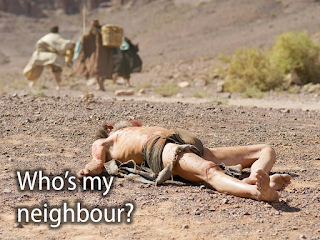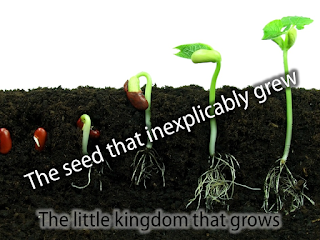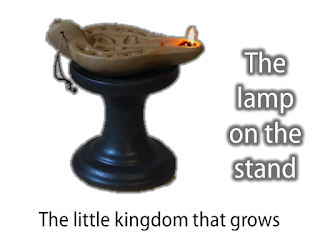Hespeler, October 1, 2017 © Scott McAndless – World Communion
Luke 10:25-36, Psalm 36:1-12, Isaiah 2:1-5
| I |
t wasn’t like you probably think. It was not like he thought that he was better than everyone else. It was that he actually tried to do his best. He was earnest. He wanted to live without displeasing God or anybody else. He recycled and separated his compost from his garbage religiously. He always brought his bags with him when he went grocery shopping. Even more important, he tried to respect people and accept them as they were. He was a lawyer and he tried to use his profession to make up for the injustices of the world.
And he was not stuck up about it either; he never boasted about any of his own good deeds. It really bothered him that other people never even seemed to try to be good, but he was still patient with them. He was just a good person. There wasn’t a soul who would say otherwise.
So what was he expecting when he came to the teacher and asked him what he needed to do to inherit eternal life? Was he just thinking that he’d be given a nice pat on the back and sent on his way with the assurance that eternal life was his? Maybe. In any case, I don’t think he was expecting a quiz on why, exactly, he conducted his life in the way that he did: “What is written in the law?” he was asked, “What do you read there?” But even there he was ready with an answer: he lived the way he did because he wanted to do his best to love God and love his neighbour.
But that did raise a question, didn’t it? Who was his neighbour anyways? Who did he have the obligation to look out for, to help, to take care of? There were so many needs out there in the world – so much he could do to make things better – but where should he start? Who did he really need to take care of? So he asked.
In response, I am sure, Jesus raised his eyes to the heavens and heaved a deep sigh. Would these people never understand? And he told a story. And in my mind, Jesus was probably about the best storyteller who has ever lived. Others may have told longer stories with more well-developed characters, but Jesus clearly had a way of getting people really engaged in what he was telling. So I don’t think that the man heard that story so much as he lived it.
It was him. It was late one night, well after dark, and for some reason he was down in North Galt walking along Ainslie St. when all of a sudden the motorcycle came out of nowhere. It just clipped him as it went by. It’s possible that the driver didn’t even know that it happened (though I doubt it). But whether he did or not, the result was the same. The lawyer ended up at the side of the road, bleeding rather too much from his head and slipping in and out of consciousness. It was probably while he was in one of those unconscious states that his wallet, identification and cell phone mysteriously disappeared.
He was, to put it simply, not in good shape. And he really didn’t have any way to pull himself together or sort himself out either. He needed help or he simply was not going to get out of this situation.
You see, that is what we often don’t get about the famous Parable of the Good Samaritan. It is natural, when you hear a good story, to find some character that you identify with. And you hear this story and figure that there are only three people that you could identify with: you either see yourself as the priest, as the Levite or as the Samaritan. These are the three actors in the story the ones who are deciding whether or not they will act like a neighbour to the man who is in need. And, of course, since the other two get it wrong, you are likely to at least want to see yourself as the Good Samaritan.
But I am not so sure that that is how Jesus intended for us to hear this story. I believe that, if Jesus really invited that lawyer into that story, he was more likely to invite him into it like this:
The lawyer lay in the muck and in the filth at the side of the road. He had lost a fair bit of blood and had a bigger headache than he ever imagined anybody could have. He had no phone, no papers, certainly no money and when he just tried to sit up a little bit, the pain that hit him was so bad that it threatened to suck him back down into unconsciousness again.
“Who is my neighbour,” he muttered to himself. Surely there is someone who is passing by who will take pity on me. Heaven knows I have taken pity on many others.
Before long, he heard some footsteps approaching. Just from the sound of them, he could tell that he was hearing some well-heeled feet – someone was wearing quality shoes and had a step that was full of confidence. Surely, he thought to himself, this will be someone who has the ability to help me. Here is someone who probably has a lot to spare and it won’t even hurt them a little bit to help somebody out. And so, as the footsteps came nearer, he strained his eyes to see who it might be, his saviour in the night. And, to his delight, as the shadowy figure came into his sight, he realized that he recognized the person. It was an old friend and ally with whom he had worked on some charitable campaigns. He smiled as he waited for him to draw near and then tried to call out his name.
But his voice wasn’t working; all that came out was a croak which only serve to startle the approaching man. He recoiled. What he saw seemed appalling to him. For all he knew, the heap of humanity that he saw in the gutter was all that was left of an addict who had gone too far, who had maybe even overdosed on something awful like Fentanyl. That kind of thing had been happening more and more in the city and he had heard horror stories about how the drug could become airborne and if someone just came too close they could overdose too. He quickly crossed to the other side of the street and proceeded to pretend that he hadn’t seen anything at all.
That was the first disappointment that the lawyer in the gutter suffered. It was not the last. Others passed by: fine upstanding citizens, community leaders, even old friends who obviously could not recognize him in his deplorable state. Every one of them allowed their fear of his state or their distaste or judgement for what they thought they saw to overcome any human compassion they might feel. They all passed by on the other side of the road.
It was only when he had completely given up hope – when he had actually decided that he was going to die there in that gutter – that he heard one final set of footprints. He looked up with a momentary flutter of hope and then his head dropped as he gave a mighty moan. This was definitely not someone who would help him. It was a young woman, an immigrant probably. She was all wrapped up in a hijab. In his eyes, at that moment, she was a victim. He didn’t understand how women are treated in Islamic cultures. He certainly didn’t understand how it is that they accept the lower positions to which they seem to be relegated. On another day, perhaps, he would have pitied her and tried to help her. But today – right now – he had no pity left for anybody but himself. He sank down in despair and finally just gave up completely.
That was when he felt the hand on his cheek. He opened his eyes to see that it was the young woman and that she knelt beside him. Her touch was cool and soothing. Her gentle voice calmed him and lifted his spirit though he didn’t understand her language. He suddenly knew that he was going to be alright. So in the end it was she who called for a cab and went with him to the hospital. It was she who managed to understand, from his ramblings, what his name was and figured out how to get in touch with his family. It was she who saved him.
The people who first heard this parable would have never identified with a Samaritan. They hated Samaritans, despised them, perhaps pitied them for their failure to be Jews. If they heard a story about a Samaritan, they would have expected the character to be the villain or the victim, never the hero.
And Jesus understood that. He understood that they’d never put themselves in the place of the Samaritan. He expected them to put themselves in the place of the man who lay at the side of the road.
This was a parable about what it means to be a neighbour and Jesus knew that it is one thing to be a neighbour when you are in a position of strength – when everything has gone your way and you can use the blessings you have received to help those who are less fortunate. It is quite another thing to be a neighbour when you are at your weakest point – when you are the one who needs a hand.
This is especially true, I think, when you have the same kind of situation in our communities today as existed in the Galilee of Jesus’ time. We live (as was also true in Jesus’ Galilee) in an incredibly diverse society where people come from all over the world to live next to each other – live with different customs, faiths and practices. In some ways it is easy for us to be neighbours to such people when we are the ones who are letting them in, welcoming them or helping them because that is what we are used to. We are used to being the majority – to being the ones who are in control and who, out of the goodness of our own hearts, let others in and allow them to be our neighbours.
That has often been our attitude but it has not always been the most helpful attitude as it can make us patronizing and paternalistic to others. I don’t really think that that is the kind of neighbouring that Jesus is calling on us to practice. He is calling us to embrace our weakness and vulnerability. He is calling us to learn to be a neighbour from the ditch at the side of the road too.
As many of you will know, we here at St. Andrew’s are about to get some new neighbours – that a group of Hindu worshippers have purchased the Lutheran Church building across the street and are planning to move in soon. I don’t know about you, but I am kind of excited about that. I hope that we can be good neighbours to them – to make them feel welcome and assist them as we can. I’ve already begun to think of ways that we can do that and I know that others have as well. But what if Jesus is calling us to experience being a different kind of neighbour to them – calling us to learn to need them, to allow them to help us, to learn from them? Now wouldn’t that be an adventure?
The Bible teaches us to love our neighbours as ourselves and Jesus told a story that seems to indicate that such love might just include learning from and growing with those neighbours wherever they might have come from. Maybe he was teaching that being a neighbour means actually needing the people who are different from you, who have different ways of thinking and different priorities. Maybe he was showing us how much we really need all our neighbours.









